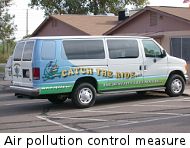Arizona: Federal Judge Overrules Legislature on Transit Subsidies
Arizona must subsidize those who ride on buses, vans and light rail, regardless of the desire of state lawmakers or voters to do otherwise. US District Court Judge David G. Campbell on Friday overturned a state law enacted in March last year to curtail excessive spending by slashing such subsidies. The legislature canceled the Local Transportation Assistance Fund, which had doled out $127 million in taxpayer cash since 1998 to various mass transit programs using funds from the Powerball lottery.
For example, Arizona funnels public money into privately run van service companies, counties, municipalities and Indian tribes under the federally authorized Section 5310 mass transit program. The grants provide capital funds for the purchase of vehicles that are used mostly to provide subsidized transport for people over the age of sixty. The University of Arizona received one of these grants through Pima County to buy three golf carts in 2008. Bullhead City offers complimentary paratransit service with 15 percent of its senior citizen passengers boarding at the Laughlin Casino Resort.
“Defendants assert that this lawsuit has no significance to air quality or transit services in the Phoenix area,” Judge Campbell wrote. “But the advisability of requiring lottery funding for transit, or other policy considerations that went into the SIP, are not for this court to decide.”
Campbell’s order effectively nullified House Bill 2012, which had repealed the Local Transportation Assistance Fund. He also ordered the state to provide up to $18 million in funding each year to such programs.
“This circuit has made clear that provisions of an EPA-approved SIP are federally enforceable in district court through the CAA’s citizen suit provision,” Campbell ruled. “Absent prior approval from the EPA, the Arizona legislature lacked authority to repeal the portions of A.R.S. Section 5-522(A) that are included in the SIP, and that the legislature’s attempt to do so therefore is null and void and the lottery funding requirement included in the SIP remains in full force and effect.”
A copy of the ruling is available in a 90k PDF file at the source link below. Pictured: a van purchased by the Apache Junction Parks and Recreation department using LTAF funding.
Source:
Paisley v. Darwin (US District Court, Arizona, 9/2/2011)
[Courtesy: Thenewspaper.com]
More by The Newspaper
Latest Car Reviews
Read moreLatest Product Reviews
Read moreRecent Comments
- Lou_BC "That’s expensive for a midsize pickup" All of the "offroad" midsize trucks fall in that 65k USD range. The ZR2 is probably the cheapest ( without Bison option).
- Lou_BC There are a few in my town. They come out on sunny days. I'd rather spend $29k on a square body Chevy
- Lou_BC I had a 2010 Ford F150 and 2010 Toyota Sienna. The F150 went through 3 sets of brakes and Sienna 2 sets. Similar mileage and 10 year span.4 sets tires on F150. Truck needed a set of rear shocks and front axle seals. The solenoid in the T-case was replaced under warranty. I replaced a "blend door motor" on heater. Sienna needed a water pump and heater blower both on warranty. One TSB then recall on spare tire cable. Has a limp mode due to an engine sensor failure. At 11 years old I had to replace clutch pack in rear diff F150. My ZR2 diesel at 55,000 km. Needs new tires. Duratrac's worn and chewed up. Needed front end alignment (1st time ever on any truck I've owned).Rear brakes worn out. Left pads were to metal. Chevy rear brakes don't like offroad. Weird "inside out" dents in a few spots rear fenders. Typically GM can't really build an offroad truck issue. They won't warranty. Has fender-well liners. Tore off one rear shock protector. Was cheaper to order from GM warehouse through parts supplier than through Chevy dealer. Lots of squeaks and rattles. Infotainment has crashed a few times. Seat heater modual was on recall. One of those post sale retrofit.Local dealer is horrific. If my son can't service or repair it, I'll drive 120 km to the next town. 1st and last Chevy. Love the drivetrain and suspension. Fit and finish mediocre. Dealer sucks.
- MaintenanceCosts You expect everything on Amazon and eBay to be fake, but it's a shame to see fake stuff on Summit Racing. Glad they pulled it.
- SCE to AUX 08 Rabbit (college car, 128k miles): Everything is expensive and difficult to repair. Bought it several years ago as a favor to a friend leaving the country. I outsourced the clutch ($1200), but I did all other work. Ignition switch, all calipers, pads, rotors, A/C compressor, blower fan, cooling fan, plugs and coils, belts and tensioners, 3 flat tires (nails), and on and on.19 Ioniq EV (66k miles): 12V battery, wipers, 1 set of tires, cabin air filter, new pads and rotors at 15k miles since the factory ones wore funny, 1 qt of reduction gear oil. Insurance is cheap. It costs me nearly nothing to drive it.22 Santa Fe (22k miles): Nothing yet, except oil changes. I dread having to buy tires.


































Comments
Join the conversation
So much for the USA being a Democracy. It's become a judgocracy.
Oh how I loathe those activist judges that don't do what I want them to do! Actually I am being redundant here because they are not activist judges if they do what I want them to do. The EPA was created by Congress and given, by Congress, a set of rules under which it must operate under. The EPA, like all administrative agencies of the United States, has the full authority of Congress under those rules because Congress delegated its authority to the administrative agency. This is a well-established part of the United States government, has been upheld on many occasions by various Supreme Courts that have leaned both left and right, and it has been this way for more than 100 years. If you don't like the rules, you get Congress to change them. You don't create a new law at the state level like Arizona did, because the courts will throw it away. The right solution but the wrong approach. Case closed.